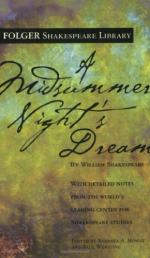|
This section contains 5,866 words (approx. 20 pages at 300 words per page) |

|
SOURCE: McGuire, Philip C. “Egeus and the Implications of Silence.” In Shakespeare and the Sense of Performance, edited by Marvin Thompson and Ruth Thompson, pp. 103-115. Newark: University of Delaware Press, 1989.
In the following essay, McGuire explores the ways in which Egeus's silence in Act IV, scene i has been interpreted by modern directors.
One way to glimpse what the future might hold for performance-centered criticism of Shakespeare's plays is to ponder the challenges posed by a silence that occurs in act 4, scene 1 of A Midsummer Night's Dream, soon after Duke Theseus and his hunting party find the four young lovers asleep on the forest ground following their baffling experiences of the night before. Lysander, “Half sleep, half waking” (4.1.146),1 begins to explain that he and Hermia were fleeing “the peril of the Athenian law” (152) that sentences Hermia to death or to a life of perpetual chastity if she...
|
This section contains 5,866 words (approx. 20 pages at 300 words per page) |

|


